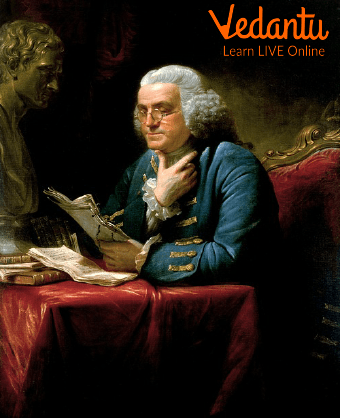




Key Contributions of Benjamin Franklin Every Student Should Know
Benjamin Franklin was born in Boston on January 17, 1706. He started reading at a young age. But when he was 10 years old, Josiah Franklin, his father, took him out of school. Ben was sent to work in the family-owned candle and soap store. He became agitated while working. He was well-versed with the newspaper industry. On a printing press, the printer set up the page letter by letter. Ben gained the ability to carefully construct sentences. He also picked up writing. He authored essays about politics. Ben fled to Philadelphia at the age of 16. For the rest of his life, he resided in the city.
Biography of Benjamin Franklin
As a publisher, scientist, writer, and inventor, Benjamin Franklin achieved recognition. However, his leadership in the early United States and the American colonies is what people most often recall about him. Benjamin Franklin was a physicist, inventor, writer, and statesman who lived from January 17, 1706, to April 17, 1790. He contributed to the creation of the American Constitution and the Declaration of Independence.

Benjamin Franklin
Contributions and Discoveries
Benjamin made some truly amazing contributions and discoveries in the field of science. His interest in science led him to become a successful scientist. He was granted the title of "First American" in recognition of his contribution to the creation of the country.
Static Electricity
Thunderbolts are caused by the abrupt release of static electricity, as Benjamin was the first to recognise. In addition, he experimented by flying a kite to demonstrate the existence of static electricity in clouds. In addition, he developed the lightning rod.
Gulf Stream
He researched the Gulf Stream, an oceanic wind current that permitted ships to travel farther distances.
Demography
Benjamin attentively studied demographics. He claimed that the availability of food has a major role in the expansion of the human population.
Music Instruments
Benjamin created the glass harmonica and the string quartet, a quartet of four people who play the violin and guitar to make music.
The Inventions of Benjamin Franklin
During his lifetime, Benjamin Franklin had a variety of positions, including printer, postmaster, diplomat, author, scientist, and founding father. Above all else, he was an inventor who came up with answers to everyday issues, developed new technology, and even made life a little more musical.
Franklin never filed for a patent despite coming up with some of the most well-known and successful inventions of the modern era. He did this because he felt that inventions should be freely shared and "that as we enjoy great advantages from the inventions of others, we should be glad of an opportunity to serve others by any Invention; and this we should do freely and generously." The following are a few of Benjamin Franklin's most notable inventions:
Lightning Rod
Franklin is renowned for his electrical experiments, perhaps best known for the kite experiment. His fascination with electricity started in earnest after he unintentionally shocked himself in 1746.

Lightning Rod
Bifocals
Like most of us, Franklin noticed that as he aged, his eyesight deteriorated and that he became both near-sighted and far-sighted. He created "double spectacles," or what we now refer to as bifocals since he was tired of switching between two sets of eyeglasses. The list of the inventions of Benjamin Franklin goes on.
Famous Quotes of Benjamin Franklin
1. “Love your enemies, for they tell you your faults.”
- Poor Richard’s Almanack, 1756
2. “He that falls in love with himself will have no rivals.”
- Poor Richard’s Almanack, 1739
Summary
Benjamin achieved great success in politics and was appointed as the first ambassador to France. Because of his cunning nature, France became an enduring ally of the United States and even sent weapons to the country. In addition, Benjamin served as Pennsylvania's governor from 1785 until 1788. The important role Benjamin had in science is likewise quite amazing. He is renowned for his contributions to the electrical industry. In addition, he studied a variety of topics, including population, weather, and sea tides. In conclusion, we can say that he serves as one of the best examples of contemporary leadership. Benjamin passed away in Philadelphia, Pennsylvania, USA, in the year 1790.
FAQs on Benjamin Franklin: Life, Inventions, and Impact Explained
1. Who was Benjamin Franklin in simple terms?
Benjamin Franklin (1706-1790) was one of the most famous Founding Fathers of the United States. He was not just a politician but also a brilliant inventor, scientist, writer, and diplomat. He is celebrated for his practical inventions, his wisdom, and his crucial role in the American Revolution and the creation of the United States.
2. What were Benjamin Franklin's most important scientific contributions and inventions?
Benjamin Franklin made several groundbreaking scientific contributions. His most notable achievements include:
The Lightning Rod: An invention to protect buildings from being struck by lightning.
Bifocal Glasses: Eyeglasses with two distinct optical powers, for both near and distant vision.
Experiments with Electricity: He famously proved that lightning is a form of electricity and introduced key concepts like positive and negative charges.
The Franklin Stove: A metal-lined fireplace that produced more heat and less smoke than an open fireplace.
3. How did Benjamin Franklin contribute to the founding of the United States?
Benjamin Franklin played a critical role in America's independence. He helped draft the Declaration of Independence and was one of its signers. As a diplomat in France, he was instrumental in securing the Franco-American alliance, which provided crucial support during the Revolutionary War. He is the only Founding Father to have signed all four of the key documents that established the U.S.: the Declaration of Independence, the Treaty of Alliance with France, the Treaty of Paris, and the U.S. Constitution.
4. Was Benjamin Franklin ever a President of the United States?
No, Benjamin Franklin was never a President of the United States. While he was a highly respected and influential leader, he was quite old by the time the U.S. Constitution was ratified and George Washington became the first president in 1789. Franklin's primary political roles included serving as a diplomat and the first Postmaster General of the United States.
5. What civic or community projects did Benjamin Franklin establish?
Benjamin Franklin was deeply committed to improving society. He was the driving force behind many public service projects, including the first public lending library in America, the first non-religious college (which became the University of Pennsylvania), the first volunteer fire department in Philadelphia (the Union Fire Company), and the Pennsylvania Hospital.
6. Why is Benjamin Franklin often seen as a symbol of the American Dream?
Benjamin Franklin embodies the American Dream because he rose from a modest background to become one of the most respected figures in the world through hard work, self-education, and ingenuity. Born into a large family with limited means, he built his success as a printer, writer, and inventor, proving that a person could achieve great things based on their merit and effort, not their social class at birth.
7. What made Benjamin Franklin's role among the Founding Fathers unique?
His role was unique because of his vast range of expertise and his long, continuous service. He was a generation older than many other key figures, earning him the title of an elder statesman whose wisdom was highly valued. His uniqueness also comes from being the only person to sign all four key founding documents of the USA, showcasing his central involvement from the early revolutionary ideas to the final establishment of the nation's government.









